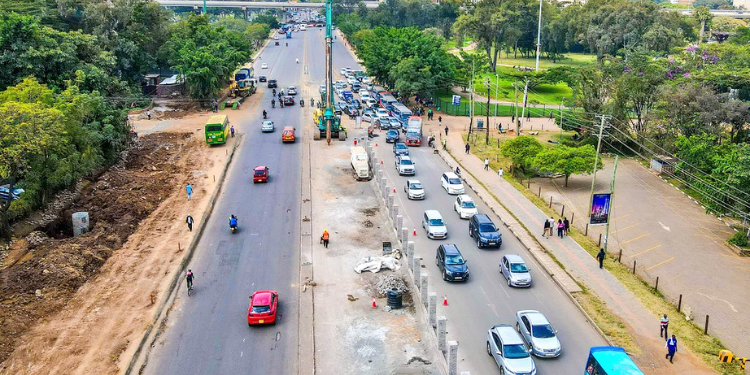The Court of Appeal has issued a ruling on key legal guidelines governing the Road Maintenance Levy Fund (RMLF) following an earlier ruling by the High Court of Kenya that declared key legal guidelines governing RMLF unconstitutional.
In June 2025, High Court choose Justice Lawrence Mugambi gave a inexperienced gentle for county governments to share out Ksh10.522 billion from the RMLF, declaring that the choice of the National Assembly to exclude county governments as beneficiaries of the conditional grants derived from the fund was unconstitutional.
The Court of Appeal has, nevertheless, suspended the implementation of the High Court choice, and granted conservatory orders and a keep of execution and implementation of orders (a), (b), (c), and (d) of the High Court judgment.
Delivered by the appellate courtroom’s President Justice Daniel Musinga and two different judges on Friday, July 25, the ruling briefly halts the landmark judgment that will have dismantled the present framework for highway upkeep funding and crippled the operations of nationwide roads businesses.
Table of Contents
Court of Appeal points ruling on RMLF
The judges handed Parliament a 12-month grace interval to align highway funding and classification legal guidelines with Kenya’s devolved system of governance.
According to the ruling, this era is meant to permit the appellants to prosecute their attraction and, critically, to allow Parliament to develop an acceptable legislative framework to align the legal guidelines with the Constitution.
KRB had disbursed Ksh3.683 billion to county governments beneath the RMLF following the High Court ruling. However, counties have been anticipating an extra Ksh6.839 billion — which they argued ought to be paid out instantly.
The Court of Appeal didn’t order the fee of the remaining Ksh6.82 billion to the counties, noting the absence of a High Court directive and the existence of a cross-appeal on the matter.
“In the petition, the first to fifth respondents had urged the High Court, upon declaring sections 47 of the Kenya Roads Act, Cap 408 and part 6 of the Kenya Roads Board Act, Cap 408 A unconstitutional, to grant the legislature a interval of not less than 12 months to implement any legislature interventions. Taking into consideration all of the related elements that we’ve identified, we’re happy that the candidates have demonstrated that the orders sought within the consolidated purposes are merited,” learn a part of the ruling.
“We due to this fact grant conservatory orders and/or keep of execution and implementation of orders numbers (a), (b), (c) and (d) of the High Court judgment, for a interval of twelve (12) months to allow the appellants prosecute their attraction earlier than this Court.”
The consolidated purposes stem from the High Court judgment that challenged the National Assembly’s selections relating to RMLF allocations, highlighting the continued disagreements over monetary useful resource distribution and the implementation of devolution.
Petition
A petition was filed contending that the National Assembly’s selections of September 28, 2023, and August 13, 2024, unilaterally excluded county governments from RMLF allocations for highway upkeep of their respective counties.
The petitioners argued that this motion violated elementary constitutional ideas of devolution and equitable allocation of assets, citing Articles 6(1), 10, 118, 186, and Section 18 of Part 1 of the Fourth Schedule of the Constitution.
Furthermore, they challenged the constitutionality of Section 47 of the Kenya Roads Act, No. 2 of 2007 (regarding highway classification) and Section 6 of the Kenya Roads Board Act, 1999, asserting their non-conformity with the Constitution.
The petitioners sought numerous reliefs, together with declarations of unconstitutionality and necessary orders for the inclusion of county governments as RMLF beneficiaries and the disbursement of Ksh10.5 billion.
However, the National Assembly and the Kenya Roads Board (KRB), the candidates within the attraction, opposed the High Court petition.
Their major argument was that income raised nationally is to be shared equitably between the 2 ranges of presidency as per Article 202 of the Constitution.
National Assembly and KRB’s submissions
They defined that county governments initially obtained RMLF as a conditional grant from the nationwide authorities from the 2015/2016 to 2020/2021 monetary years, constituting 15% of the RMLF.
However, in the course of the approval of the third-generation income sharing formulation (as per Article 217), the conditional grant from RMLF was discontinued.
The funds for county roads have been as a substitute integrated into the county governments’ equitable income share, which noticed a major enhance (e.g., from Ksh316.5 billion to Ksh370 billion).
Further, the National Assembly asserted that reinstating RMLF as a conditional grant would result in “double allocation” of funds to county governments and drawback nationwide authorities highway businesses.
The High Court affirmed its jurisdiction and dominated in favor of the petitioners. It declared that the National Assembly’s impugned selections undermined devolution and have been unconstitutional.
The Court additionally discovered sections 6 of the Kenya Roads Board Act, 47 of the Kenya Roads Act, and seven of the Roads Maintenance Fund Act unconstitutional for undermining devolution ideas.
Aggrieved by this choice, the National Assembly and KRB appealed, in search of conservatory orders to remain the execution and implementation of the High Court’s declarations.
They argued that their attraction was controversial and that if the keep was not granted, the attraction can be rendered worthless, inflicting irreversible hurt to public curiosity.
After contemplating all submissions, the Court of Appeal confirmed that the appeals have been certainly controversial and sided with the candidates on the worthless and public curiosity arguments.
The judges acknowledged that a direct invalidation of the statutory framework for highway classification and RMLF administration would result in “complete chaos and dysfunction,” inflicting “appreciable and irreversible loss, distress and hurt to the general public”.













